This post originally appeared on the Dealspotr blog. Dealspotr is the most accurate coupon site that pays you to save. I'm @ParentingAuthor on Dealspotr, use my link to join today and earn 5,000 bonus points.
 Guest post by Angela Brown
Guest post by Angela BrownTechnology is advancing so quickly! When I was a kid, the only learning tools I had access to were books (encyclopedias and dictionaries included), television and people. Today, kids have access to a myriad of learning tools and games at their fingertips. Mobile devices, tablets and unparalleled access to the internet make learning easier than it has ever been before.Unfortunately, access to so much information has a few drawbacks, too. The quality of information available for parents and children varies widely. And while letting little ones play games and learning activities on phones and tablets can certainly help them get ahead, it can also be a dangerous waste of time if you don’t know what to look for.
I’ve included some helpful tips for finding the best apps and avoiding the cruddy ones at the end of the article. So, don’t forget to keep reading after the app suggestions.
Are apps good for kids?
Before I get into the list of apps, let’s chat for a second about the benefit of these games for kids. Some parents will tell you they let their kids play on their tablets all day; other parents would sooner lock themselves in a room with a zombie than let their kids touch the things.Fortunately for everyone, the answer falls somewhere in the middle. There are a few clear benefits to letting little ones have some time with electronic games including:
Kids prepare for the future: Many jobs today require people to know how to use computers, tablets, and cell phones. That’s not likely to change anytime soon. Kids are quick learners (my 8-year-old can navigate my phone faster than I can) and mastering the technology at a younger age could help them in the future.Apps are portable: Kids can learn anywhere. To sort of quote Dr. Seuss: You can use them in a box, with a fox, in a house, and with a mouse. They can use apps on a train or in the rain. They can use them here or there. They can use them everywhere. While they certainly shouldn’t have their faces staring at a tablet all the time, they can learn anywhere -- even on long car trips!
Apps can develop hand-eye coordination: If you find the right learning apps, your little ones can get a handle on tough muscle tricks like tracing and following patterns.
There are negative drawbacks to the introduction to this type of technology at a really young age, but those drawbacks are almost always tied to too much exposure. A child can have trouble falling asleep and become more agitated if they spend hours in front of a TV or a tablet. Monitoring the amount of time your little ones use electronics is very important.
If you’re struggling to keep media time in check, here are a few ideas:
- Set a timer for your little one. When the timer ends, it’s time to get off the tablet.
- Put a lock on their tablet during off hours so they can’t access games without your permission.
- Have your child earn media time by doing chores, reading a book, or participating in other activities that don’t involve a screen.
- Play with your kids on their tablets. Sit down and do some of the activities with your little one. You’ll get a little extra cuddle time while you help them learn.
The best apps for toddlers and preschoolers
We’ve compiled a list of apps that are educational and fun for the toddler age. These games rank well among parents, are free from adult content, and provide learning opportunities along with fun characters and games. Some of the free apps may run occasional advertisements, but to date, we’ve had no issues with inappropriate (or excessive) interruptions during game play.When considering apps to include on this list, we looked at a variety of sources (including our own phones and tablets!). We looked at educator recommendations, parent comments, and general feedback from users. We skipped apps that were mostly video based and tried to find games that were as interactive as possible to encourage active learning.
Alpha Tots
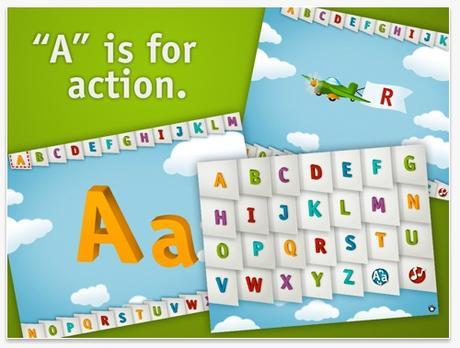
Ages 2-5 - iPad ($2.99) - Android ($2.99)
Alpha Tots is an interactive game that is colorful and fun and provides educational reinforcement as little ones learn their letters and their letter sounds. Alpha Tots is appropriate for kids with special needs.
Tots will learn their letters and alphabet sounds with bright colors and fun noises. Visual and audio cues help kids learn to associate each letter with the appropriate sounds. This app is easy to navigate, so little ones can learn and play all on their own.
Each letter features a game (like growing tomatoes, recycling, and playing with robots) to help kids associate that specific letter with a fun activity. Parents like that kids are having fun while learning, and that the interactive aspects of the app keep little ones entertained for more than a few seconds.
Montessori Crosswords
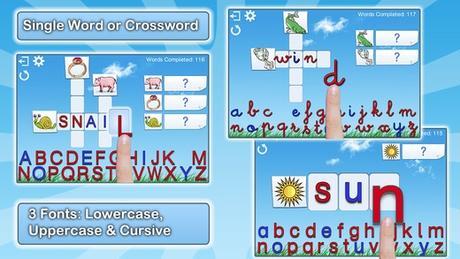
Ages 3-10 - iPad ($2.99) - Android (Free)
This app is perfect for toddlers to elementary school age kids. The versatility of this app (paired with literacy learning) makes it a great option for parents with older and younger kids.
Beginning levels show kids how to match phonetic sounds with the corresponding letters. Older levels on the game help kids master basic skills while increasing their vocabulary. The app features thousands of crossword puzzle games and 300 vocabulary words. Kids will learn new skills and how to apply the information.
Fun colors and chunky letters make the game appealing without feeling too babyish. Fun sounds and animations keep the app feeling like a game. Other features include the option to display text in all capitals, lowercase or cursive letters. Parents like that the app also features hints so a child doesn’t get too frustrated if they are struggling to find an answer.
Little Writer
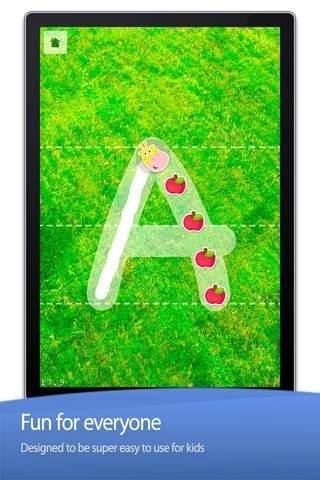
Ages 2-5 - iPad (.99)
Little Writer is a tactile way for little ones to learn how to shape letters and numbers in a fun environment.
Kids will love that this app feels and looks like a game. Bright colors and fun cartoon animals and vehicles show kids how to trace their letters and numbers. The app reinforces proper letter formation with the timing of their tracing pal. Kids get positive feedback every time they finish a letter, number, or word. The interactive instruction of this app is like having an actual instructor sit with the child offering positive reinforcement.
An extra perk: perfection is not a requirement. If kids get a bit off track, they can keep going. The app will start them over on the letter (or latest step in drawing the letter) if they go too far off course.
Parents love that they can customize the app including choosing the order in which letters appear, adding new words, and recording their own voice to narrate the activities.
Rosetta Stone: Kids Lingo Letter Sounds
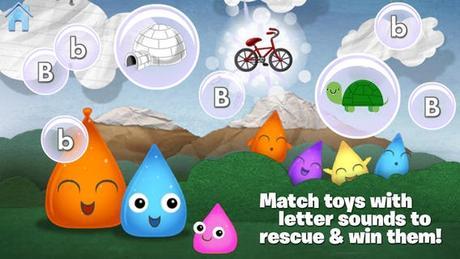
Ages 3-6 - iPad (Free) - Android (Free)
This app was recognized as the iKids Awards Winner for Best Preschool Learning apps. The app offers English and Spanish reading and speaking games and activities.
The app teaches letter sounds and Spanish vocabulary. Kids will love animated friends that help them through each activity. Using the microphone on a smartphone or tablet, kids can practice speaking their new Spanish vocabulary to get help with their pronunciation.
Parents can receive email updates about their child’s progress (and usage) in the game.
Note: The game can be upgraded to a “full” version for a fee. Parents can add a password to avoid any inadvertent in-app purchases.Park Math
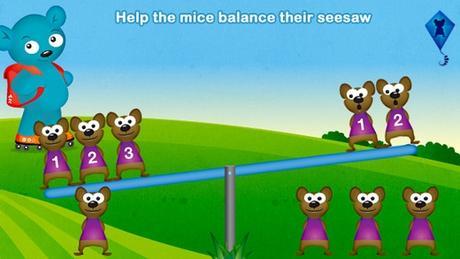
Ages 3-5 - iPad (Free) - Android (Free)
This app excels at teaching math effectively using different learning methods for maximum reinforcement. Unlike many other math apps that just have children click to answer, this app teaches through story problems and contextual correspondence (like having your child feed 7 apples to a hungry hippo).
Kids will love the colorful characters, fun games and cheerful voice helping them through their challenges. This app also covers all basic math skills from counting and sorting to sequencing, patterns, logic, and operations. There are two levels. The app is easy to navigate so kids can play this learning game on their own.
This app follows some of the common core standards, helping to reinforce what your little ones are (or will be) learning at school.Dr. Seuss Collection
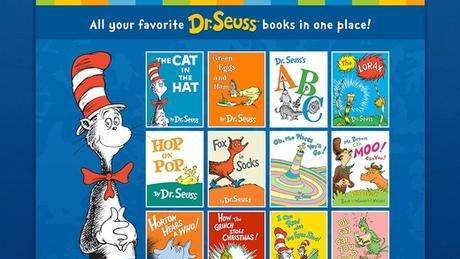
Any age - iPad (free) - Android (Free)
We love Doctor Seuss. This free app provides free access to digital copies of the books including The Cat in the Hat and The Foot Book, among others. The app also includes a few extra features, which is why it earned a spot on this list.
In addition to the original text and illustrations from Seuss’s books, the app also includes games and the ability for a kid (or parent) to record their own voice reading the stories.
Kids will love the ease of the app and the ability to have their favorite stories read to them in a click. They’ll also love the sound effects and music that accompanies the stories. Considering that most children’s book apps charge a monthly fee, we think this app is a steal!
Busy Shapes
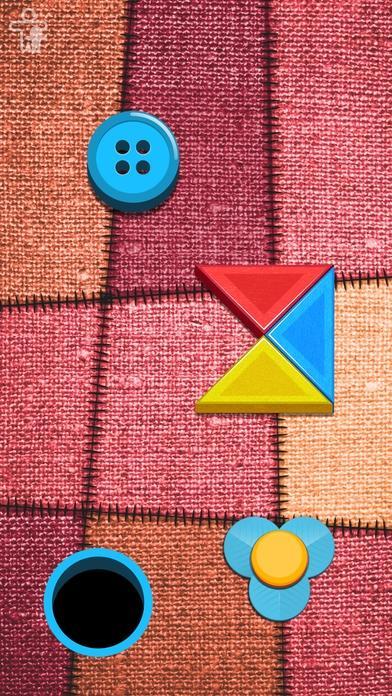
Ages 2-5 - iPad ($2.99)
This game combines shape learning with logic and progressively gets harder providing a constant challenge for little minds.
The premise of the game is that kids drag items into different holes based on shape and/or color. As the levels increase, obstacles appear to encourage more creative problem-solving skills. Busy shapes include 38 levels and allows parents to create more than one user profile.
Kids will love the colorful graphics and different textures in the images. Parents will love that the app is simple to use and provides increasingly difficult challenges.
Moose Math
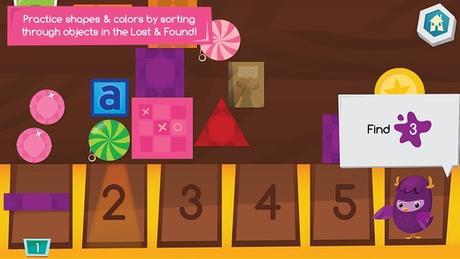
Ages 4-6 - iPad (Free) - Android (Free)
Moose math lets kids tackle a variety of different math skills including counting, basic geometry, and basic algebra in a modern “building environment.” The game uses real world examples (like following a recipe) to boot.
Kids will learn math skills with the aid of their friends Moose, Puck, and Sass. The games take place in a virtual city where kids can visit one of three buildings to take on different challenges. Kids will love that they are able to earn rewards to decorate their city for completing tasks. Each game has six different levels so kids can keep earning prizes as they develop their math skills.
This game meets common core standards so that kids can apply what they are (or will be) learning in school. Parents will also love that the app sends a progress report showing how their little ones are doing and in which areas they could use a little help.
Music Superheroes
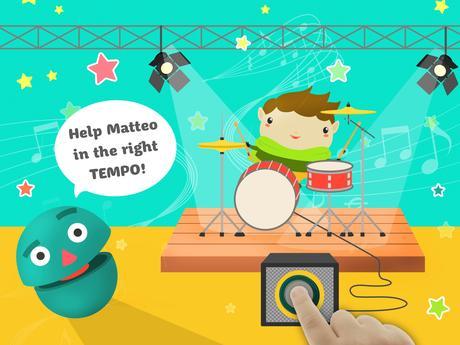
I love that this app isn’t just another noise-making music player. Kids get to play with instruments, but they also learn how to keep tempo, follow a rhythm, and read notes.
Music superheroes includes five games. Each game covers a different topic including tempo, rhythm, notes, play, and instrument identification. Kids can graduate to more difficult levels within each game. The app also exposes children to popular tunes as well as classical tunes.
Kids will love the variety, colorful background, and fun musical tunes. They’ll also love learning how to play a song. Parents will love that the noise the app is producing is worth it, as kids learn to recognize instruments and clap on a beat.
Breathe, Think, Do with Sesame
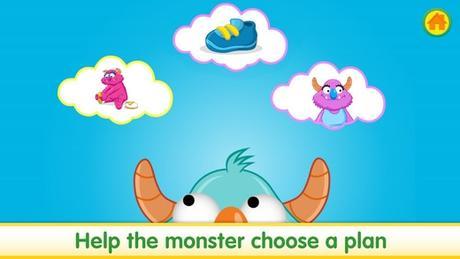
Ages 2-6 - Android (free) - iPad (free)
Kids can have a hard time learning how to calm down when they’re upset. This fun app teaches little one’s simple techniques to lower their anxiety level when they are angry or upset. A little less crying after we say no? Yes, please.
Kids will love interacting with their favorite sesame street characters. While the game is short, it’s sweet and one the kids can play multiple times. Kids will also enjoy learning different ways to wait patiently. The game functions in English and Spanish.
Parents will love watching their kids learn how to work through problems and how to deep breathe. The parent’s section also includes a few helpful tips for managing their toddlers when they’re being less-than-saintly.
Choosing the Right Apps for Your Kids
Like all things techy, there are dangers lurking in the shadows of the app store. Some of the “dangers” are more inconvenient, while others threaten to expose your children (or their devices) to adult content or viruses. Taking time to do a little research will ensure that your little ones have access to quality learning/entertainment sources safely.A few things to look for:
In app purchases: I learned the hard way that you need to password protect any app that offers in-app purchases ($40 and 12 Frozen e-books later). Shockingly, some apps geared towards kids charge upwards of $99 for “special” packages. Don’t believe me? Jack Black’s kid spent almost $3,000 in in-app purchases before dad caught on.Most apps tell you if they offer in-app purchases. You can shut them off (or put on a password) to keep your wallet safe.
Advertisements: A lot of apps that are free are free because ads interrupt game play. Some children’s apps don’t have many (or any) outside ads. Try playing a round or two of the game to see if the advertisements are going to be too much for your little one. There are also apps you can download that block all or some advertisements so your kids don’t see inappropriate content. Many work well with apps.Chat features: There’s been a recent scandal regarding a popular kid’s app Roblox. The game features a chat function where kids can talk to other players. Some adults have allegedly been using this feature to prey on young kids. If an app has this feature, in addition to the games, you should be able to block the chat function completely.
One final tip: You can do a quick search for most apps on Common Sense Media. The website will give you an age range and let you know what type of content to look out for. Don’t forget to check out reviews on your Google Store of Apple Store before downloading an app. Customers can give helpful feedback about the program.
What are your favorite educational apps for your kids?
Angela Brown posted this article on the Dealspotr blog. See @AngelaJBrown's blog at http://www.angelajbrown.com/.
